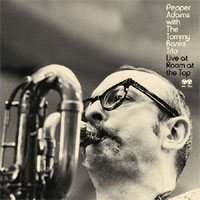Pepper Adams with the Tommy Banks Trio • Live at Room at the Top Reel to Real RTR-CD-008  olks used to claim the
1970s were bad for jazz -- the decade when Anthony Braxton, the Art Ensemble of Chicago,
Carla Bley, Julius Hemphill, Oliver Lake, John McLaughlin, Chick Corea, Jack DeJohnette
and many others made some of their best records. True, those creatives did eclipse
formerly reigning bebop/hard-bop diehards who were working less -- although Art Blakey
managed to crank out a dozen records or so over that decade. In truth, clubs and ballrooms
scattered around the US (and Canada) still booked mainstream jazz stars, who’d often
travel solo, playing with local rhythm sections. Bebop had been around since the
’40s, and musicians everywhere knew the language and standard repertoire. Onstage
train wrecks were few. olks used to claim the
1970s were bad for jazz -- the decade when Anthony Braxton, the Art Ensemble of Chicago,
Carla Bley, Julius Hemphill, Oliver Lake, John McLaughlin, Chick Corea, Jack DeJohnette
and many others made some of their best records. True, those creatives did eclipse
formerly reigning bebop/hard-bop diehards who were working less -- although Art Blakey
managed to crank out a dozen records or so over that decade. In truth, clubs and ballrooms
scattered around the US (and Canada) still booked mainstream jazz stars, who’d often
travel solo, playing with local rhythm sections. Bebop had been around since the
’40s, and musicians everywhere knew the language and standard repertoire. Onstage
train wrecks were few.
Baritone saxophonist Pepper Adams was one of those ’70s wanderers. A product of Detroit’s high-standards hard-bop scene, where he (like umpteen others) was mentored by Barry Harris, he hit his stride in New York starting in the late ’50s, recording as a sideman on Blue Note and with Charles Mingus, and forming a partnership with trumpeter Donald Byrd. Starting in 1966 Adams was a mainstay of the (new) Thad Jones/Mel Lewis big band playing the Village Vanguard every week. When he was coming up, he had his pick of baritone role models, principally the Ellington band’s Harry Carney, with his deep-river-bottom gravitas, and the mellifluous, light-on-his-feet Gerry Mulligan. Adams was drawn to the gruffer, bebop-inflected sound of Leo Parker and Cecil Payne. Adams got a particularly gravelly sound from the big horn, favoring the basement register. He made it pack a wallop, and he had plenty of steam, as you can hear on this newly unearthed 1972 college student-union gig from Edmonton, with a fine local rhythm section: jittery boppish pianist Tommy Banks, alert-punctuating drummer Tom Doran, and Bobby Cairns, a guitarist filling in on electric bass who’s fluently in the jazz-contrabass idiom, soloing or in support. (One of the band’s four nights playing a glass-walled room at the University of Alberta was recorded by a house engineer; the show’s producer stored the 10" tapes in his garage for decades. All things considered, the mono sound is clear, not glass-boomy, if sheared of highs). If you don’t know Pepper Adams, you could start here. He came to play; some solos run over ten minutes. And he’s always, always swinging, locked in with a trio that sounds only too happy to push a soloist already rarin’ to go. There’s a partial take (from a damaged tape) of “Stella by Starlight” on the seven-tune double CD edition (not on the five-track LP two-fer, mastered by Kevin Gray) where they all pounce on the beat, ferocious. Some jazz/bebop improvisers coast over a tune’s chords, conveying a general impression of a song’s harmonic trajectory. Others soloists mark every quick-moving passing chord, tasting them one by one. Coleman Hawkins showed everyone who came after how that’s done, and by no coincidence (as the notes remind us) he was among of Adams’s many distinguished fans (Dizzy Gillespie, Don Byas, Horace Silver). He insatiably gobbles up those chord changes, bite by bite, usually up-tempo, as on Sonny Rollins’s “Oleo” or Adams’s own “Patrice.” But addressing each chord in turn at high speed, a uniformity of phrasing may creep in. Even on ballads -- “Civilization and Its Discontents” and CD bonus track “Time on My Hands” -- he double-times more than he lolls around. On previous issues from Cory Weeds’ Reel to Real
label, Resonance Records’ reissue juggernaut Zev Feldman co-produced, and Weeds has
adopted Feldman’s approach to filling out a fat album booklet with sundry interview
extracts that aren’t always especially revealing or on point, an approach that
increasingly feels both formulaic and scattershot. You’d think a label based in
British Columbia would mention pianist Tommy Banks had been a Canadian celebrity, TV host
and member of the senate for a decade. A little national pride is in order. |
